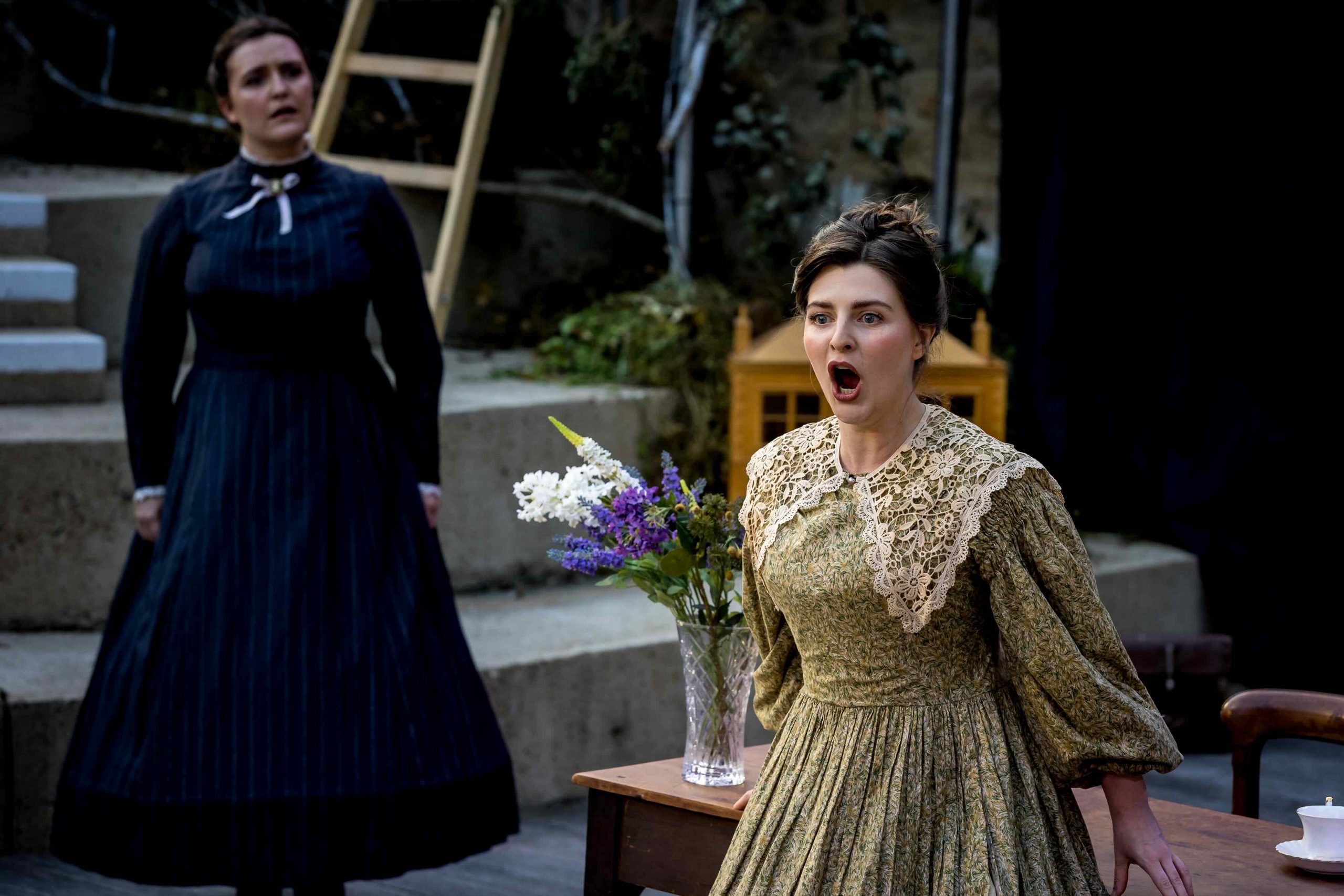
Waterperry Opera Festival made the most of the glorious Waterperry Gardens and the elegant Georgian house for a veritable musical feast of summer lushness. This young, dynamic festival has developed into a real summer highlight.
The Festival makes excellent use of the different spaces available for performance with the elegant period house that edges the Waterperry ornate gardens used for what is usually the most conventional performance, although experimentation is always evident.
This year the historic building formed the backdrop for a new take on Rossini’s Barber of Seville, staged as a Franco era film set, where aspiring actor Almaviva wooed starlet Rosina from under the nose of controlling director Bartolo.
This generally worked and even people unfamiliar with the famous opera will probably have followed the narrative well enough. Quite why characters scrawled on a large picture of Franco was not clear unless director John Wilkie was equating Spanish fascism with the controls over Rosina by her “mentor”.
Again, the company made full use of the possibilities of the house with its useful balcony and opening windows and rooftop balustrade.
Patrick Keefe absolutely dominated the performance as a stupendous Figaro, vocally secure and dramatically full of fun and energy. After a rather shaky start, Brenton Spiteri rose to the role of Almaviva. His comedic acting did not completely convince but that was difficult against such powerful work by Keefe. Kieran Rayner was on top of his game throughout as Bartolo. Smelo Mahlangu sang a sonorous Basilio but was a a little lacking in dramatic punch. Faryl Smith sang an elegant Berta although her characterisation was unclear beyond being an elegant film star which did not fit in with the usual understanding of the role. A sprightly mezzo from Esme Bronwen-Smith with darkness in all the right places to match the fizz of coloratura was a delight.
More successful this year, however, was the haunting Turn of the Screw in the garden’s amphitheatre. The arch of the bridge that is the backdrop of the amphitheatre was used effectively for some of the comings and goings of characters. I would have dropped the smoke effects as the staging is spooky enough anyway. What worked particularly well was how characters appeared and disappeared out of the amphitheatre itself. This meant that at times audience members looked around and behind them, sometimes imaginings the singers were about to appear.
Bertie Baigent conducted with good balance between the orchestra and the singers, maintaining the intricacy, darkness and clarity of Britten’s score. The children were spookily well taken by Beth Burdge and Ivo Clark. Even more sinister was the Narrator and Peter Quint from the excellent Robin Bailey. His scenes with the deeply troubled Miss Jessel from Sian Dicker were particularly evocative of the psychological horror of the work. Charlotte Bowden was captivating as the Governess who slips into madness while Georgia Mae Ellis was similarly compelling as Mrs Grose. All gave characterisations and vocal performances that had you on the edge of your seat, and slightly worried that you found Quint rather appealing!
Rebecca Meltzer made effective use of that setting although some of the detailing, such as the children’s macabre collections, were superfluous to the tension. Generally, her pared back, minimalist setting for isolated Bly House, the setting of Henry James 1988 novel, was extremely atmospheric and effective. As the light faded, we had illuminated glimpses of Waterperry House and scintillating light and dark played its game in playing with our own senses.


Esme Bronwen-Smith

The performance of Peter and Wolf was great fun from storytellers and dancers Ben Maddison and Lizzie Buckingham and the Waterperry Opera Festival Orchestra players who charmingly introduced the character’s themes before performing Prokofiev’s score. The well-behaved children in the audience were clearly captivated. I enjoyed the whole experience and would sit through it again quite happily.
The exquisitely performed Mozart and Mendelssohn’s Serenades from the friendly Carnaby Quartet of Emily Trubshaw, James Tudball, Laura Cooper and Bella Lorenzo-Giguere filled the gardens with gentle sounds. The young musicians neatly introduced the diverse choices of work.

The ballroom of the house that was so effective for Jonathan Dove’s Mansfield Park, did not work quite so well for his Nights Not Spent Alone. This wa just because it is a story of sleeplessness and shuttered out bright sunshine rather weakened the insomnia feel of the performance, as our solo performer tossed and turned in bed, wandered her bedroom and gave several dramatic monologues. This work, setting his song cycles into one theatrical piece, was magnificently performed by Hannah Bennett who never faltered in vocal and dramatic interpretation. Yet the warm voiced mezzo soprano struggled with the fact that this was a glorious sunny day and shuttered up windows failed to create the required atmosphere despite Thomas Henderson’s sympathetic staging. Bennett has a compelling singing and acting presence and made this performance her own.
That sunny weather was, of course, a major boost for the festival as everyone was able to enjoy the beautiful gardens, parkland, water features and shaded areas for picnics.
Main image: Georgia Mae Ellis and Charlotte Bowden